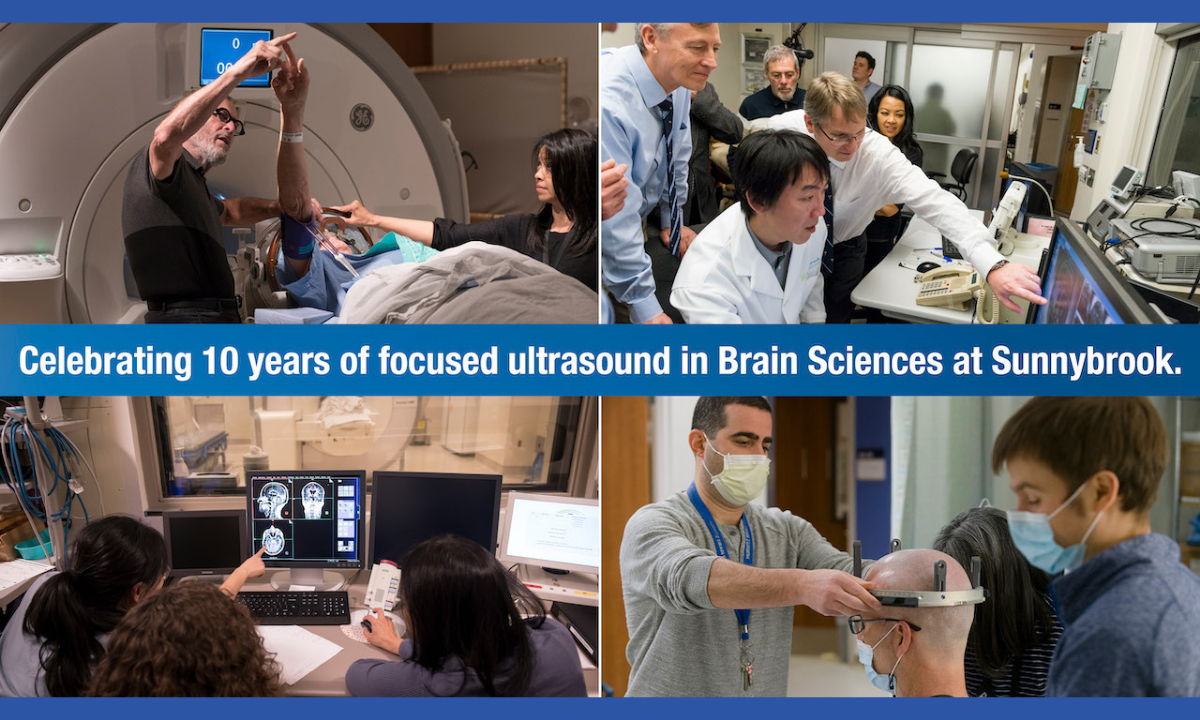Sunnybrook marks 10-year anniversary of ‘game-changing’ brain surgery without scalpels
How focused ultrasound research at Sunnybrook is revolutionizing the treatment of brain disease in Canada and around the world
Sunnybrook Health Sciences Centre is celebrating a historic 10-year milestone of treating the brain with MRI-guided focused ultrasound, an image-guided technology that uses ultrasound energy to target areas in the brain.
In May 2012, Sunnybrook researchers were the first in Canada to treat a patient using focused ultrasound in essential tremor, a common and debilitating brain disorder that causes involuntary shaking in the body, primarily the arms and hands. Sunnybrook’s groundbreaking research led to approval of the treatment by Health Canada and the United States Food and Drug Administration (U.S. FDA) in 2016.
“It was a major shift away from the conventional treatment of essential tremor, which typically is open brain surgery; this was a less invasive approach, without scalpels or incisions,” says Dr. Nir Lipsman, neurosurgeon and director of the Harquail Centre for Neuromodulation at Sunnybrook. “Focused ultrasound was then, and continues to be, a game-changing innovation in the treatment of brain disorders.”
With a specialized helmet device, focused ultrasound harnesses the power of sound waves to precisely target specific areas inside the brain. For the treatment of essential tremor, high-intensity focused ultrasound waves lesion the brain cells responsible for tremor, which can significantly improve symptoms for patients.
“Before focused ultrasound, I would try and hold something and I would shake all the time, whereas afterwards, it was wonderful. It was steady,” says Cliff Tony Lightfoot, one of the first patients with essential tremor in Canada treated with focused ultrasound in 2012. “I can eat, drink, write, and look after myself properly. Focused ultrasound can change a person’s life. I am proud to have participated in this work. I knew if it was a success, it would help other people.”
Impact of Sunnybrook’s pioneering study for patients with essential tremor
Sunnybrook’s groundbreaking research demonstrated the safety of focused ultrasound in essential tremor which, in 2016, led to Health Canada and U.S. FDA approval of focused ultrasound as a treatment for essential tremor.
In some provinces, such as Ontario, funding for focused ultrasound treatment for essential tremor is available to patients.
Since the inaugural trial 10 years ago, Sunnybrook has treated nearly 280 patients with essential tremor using focused ultrasound.
“Our team’s experience has grown exponentially over the years, which means a faster focused ultrasound procedure and shorter recovery time in hospital for patients,” explains Dr. Michael Schwartz, the neurosurgeon who led Sunnybrook’s pioneering study. “We are now exploring how to expand the treatment to reach more patients. In recent years, we started investigating focused ultrasound for bilateral essential tremor and treating both left and right arms and hands.”
Sunnybrook’s inaugural study of focused ultrasound in essential tremor treatment was supported by the Focused Ultrasound Foundation and InSightec.
Sunnybrook research in focused ultrasound for challenging brain disorders from 2012 to 2022
Over the past decade, Sunnybrook has become a global leader in focused ultrasound research.
- First in North America: Sunnybrook’s clinical trials in high-intensity focused ultrasound for severe depression and obsessive-compulsive disorder.
- First in the World: Sunnybrook researchers are the first in the world to study low-intensity focused ultrasound in the opening of the blood-brain barrier or delivery of therapies directly to the brain in brain cancer, Parkinson’s disease, Alzheimer’s disease, and Amyotrophic Lateral Sclerosis (ALS). These clinical trials use low-intensity ultrasound that interacts with microscopic bubbles injected in the blood stream, which vibrate causing a temporary opening, allowing therapies to pass a targeted area of the blood-brain barrier, a protective layer of cells around the brain. The blood brain barrier closes within hours of the procedure.
The future of focused ultrasound at Sunnybrook
Sunnybrook is a Focused Ultrasound Centre of Excellence. It is the only Canadian site as designated by the Focused Ultrasound Foundation in 2016 and recognizes the pioneering work of Sunnybrook’s research and clinical teams.
“The past 10 years since the first tremor treatment truly demonstrate that focused ultrasound is revolutionizing how the brain will be treated in the future. We are entering a completely new era in brain treatments because of focused ultrasound,” says Dr. Kullervo Hynynen, pioneer of focused ultrasound and Vice President of Research & Innovation at Sunnybrook, he and his team are developing a new focused ultrasound device, and conducting research to expand treatment to more patients. “In the future, we may see enhanced personalization of treatments for patients because focused ultrasound is image-based and allows treatment to be tailored for each person.”
Interdisciplinary collaboration among researchers and clinicians at Sunnybrook is a driving force in the discovery of novel interventions for challenging brain conditions and research in the new Garry Hurvitz Brain Sciences Centre, which is currently being built at Sunnybrook.
A critical catalyst of Sunnybrook’s research in focused ultrasound is philanthropic investment.
To learn more about Sunnybrook’s focused ultrasound milestones: sunnybrook.ca/fus
Media contact:
Jennifer Palisoc
Communications Advisor
Sunnybrook Health Sciences Centre
jennifer.palisoc@sunnybrook.ca





